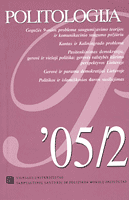Konceptuali karo metafora Didžiosios Britanijos rinkiminiame diskurse
Conceptual War Metaphor in the Elektion Discourse of Great Britain
Author(s): Jurga CibulskienėSubject(s): Politics / Political Sciences
Published by: Vilniaus universiteto leidykla & VU Tarptautinių santykių ir politikos mokslų institutas
Keywords: Conceptual metaphor theory; George Lakoff; Elections as War; Labour and Conservative parties in Great Britain; Ch.Fillmore; M.Minsky; and E.Lassan'; Theory of frame and metaphor-scenarios;
Summary/Abstract: The present research investigates election discourse of Great Britain in 2001 on the basis of conceptual metaphor theory. The main idea of this theory lies in George Lakoff's words "that metaphor is pervasive in everyday life, not just in language but in thought and action. Our ordinary conceptual system, in terms of which we both think and act, is fundamentally metaphorical in nature." The cognitive linguistic analysis done assumes that politicians as well as ordinary people see the elections in the terms of war. Therefore, the conceptual metaphor, characterizing and determinating the British politicians and ordinary people's consciousness, language and actions, is Elections as War. The findings suggest that it is worth analyzing the realization of this metaphor in the election discourses of the Labor and Conservative parties. The further investigation is grounded on Ch.Fillmore, M.Minsky and E.Lassan's ideas about frame and metaphor-scenarios. According to the theories the frame of war comprises some dictionary as well as encyclopedic knowledge for apprehending stereotypical situation. The detailing of the frame is called scenarios. Consequently the frame war entails such parts: the aim of war, sides taking part in war, preparation for war, fight, attack, defense, retreat, victory and losing. The results have revealed that both the Labor and Conservative parties develop the frame of war. However, the difference lies in the way of doing it and giving different priorities. First of all, in the discourse of the Conservative Party the concepts of adversary and traitor exist while the Labor discourse does not use such concepts. Also, the Conservatives emphasize the beginning of election-war, i.e. preparation for it and attacks. At the same time the Labor party lays emphases on its strengthening during the election period. The concept of fight has been extensively developed in the Conservative as well as the Labor discourse. Yet the Labors do not realize all contextual surroundings the way the Conservatives do. Above all the main difference between the Conservatives and the Labor election discourse lies in the idea that the former make stress on morality and use high style while the latter do not do that. The paper provides ample of linguistic examples showing the existence of conceptual metaphor Elections as War in the mind of politicians and ordinary people.
Journal: Politologija
- Issue Year: 2003
- Issue No: 1 (29)
- Page Range: 132-158
- Page Count: 27
- Language: Lithuanian

